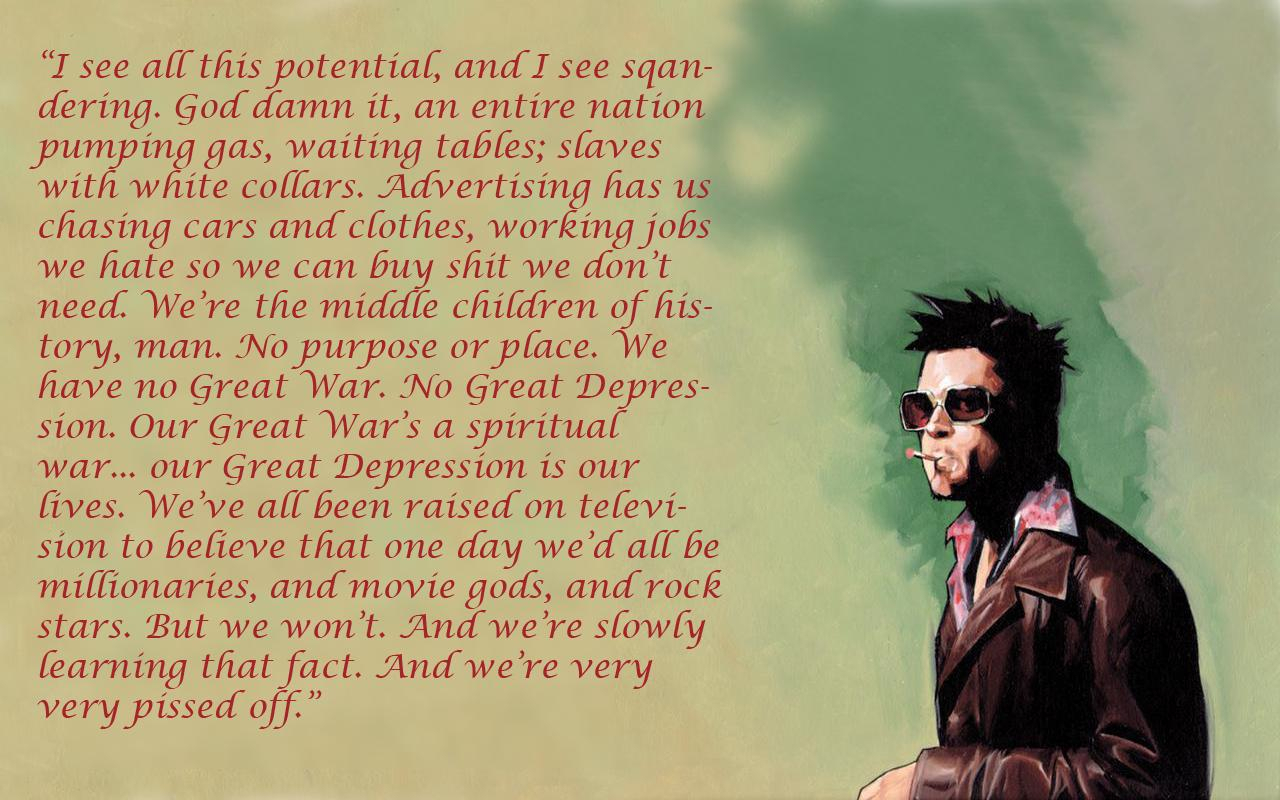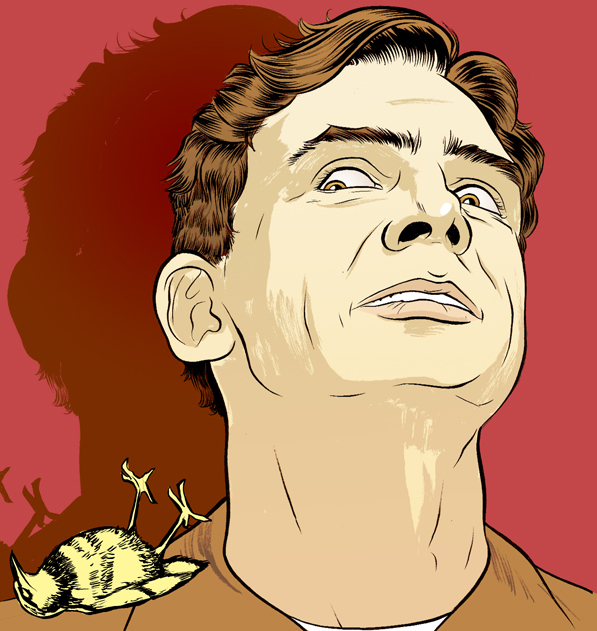
[Illustrations by ALEX FINE]
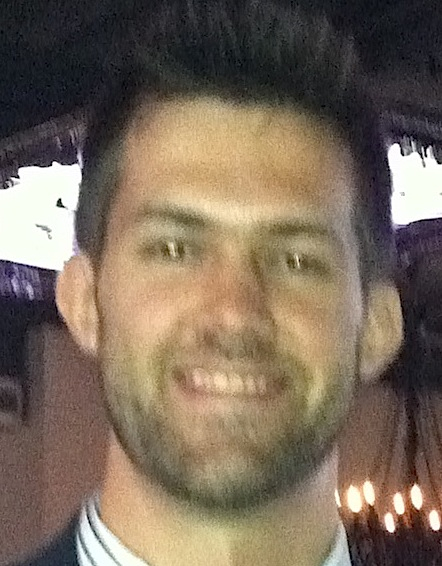 BY ALEX POTTER Fight Club author Chuck Palahniuk has just published his 11th novel, Damned, the first installment of a trilogy that documents a few days in the afterlife of Madison Spencer, the dearly departed daughter of a filthy rich film producer father and narcissistic movie star mother. Madison dies on her 13th birthday in a freak accident that wouldn’t be out of place in the apocalyptic imagination of Tyler Durden. Palahniuk’s luridly cinematic rendering of hell—think screenplay by Milton, based on the novel by Dante and directed by John Hughes—is littered with sticky-sweet Halloween candy and pivotal scenes take place on an Dali-esque desert plane comprised of finger- and toenail clippings. Damned teams up the ill-fated Madison with a pack of dead teens who resemble nothing so much as a macabre Breakfast Club. As absurd as all this sounds, Palahniuk insists it’s just another love story. Of course, Chuck P insists that all of his novels—including the eerily prescient, nihilistic anti-consumerist psychosis of Fight Club—are love stories. To advance his reading at the Free Library, Phawker recently got Mr. Palahniuk on the horn to shed some light on his latest mind-fucking narrative.
BY ALEX POTTER Fight Club author Chuck Palahniuk has just published his 11th novel, Damned, the first installment of a trilogy that documents a few days in the afterlife of Madison Spencer, the dearly departed daughter of a filthy rich film producer father and narcissistic movie star mother. Madison dies on her 13th birthday in a freak accident that wouldn’t be out of place in the apocalyptic imagination of Tyler Durden. Palahniuk’s luridly cinematic rendering of hell—think screenplay by Milton, based on the novel by Dante and directed by John Hughes—is littered with sticky-sweet Halloween candy and pivotal scenes take place on an Dali-esque desert plane comprised of finger- and toenail clippings. Damned teams up the ill-fated Madison with a pack of dead teens who resemble nothing so much as a macabre Breakfast Club. As absurd as all this sounds, Palahniuk insists it’s just another love story. Of course, Chuck P insists that all of his novels—including the eerily prescient, nihilistic anti-consumerist psychosis of Fight Club—are love stories. To advance his reading at the Free Library, Phawker recently got Mr. Palahniuk on the horn to shed some light on his latest mind-fucking narrative.
PHAWKER: So you currently live near Portland, right?
CHUCK PALAHNIUK: Yes.
PHAWER: Damned is your twelfth novel, right?
CHUCK PALAHNIUK: I gotta count. Fight Club—I’m counting on my fingers—Survivor, [Invisible] Monsters, Lullaby, Choke, Diary, Haunted, Rant, Snuff, Pygmy is 10, Tell All is 11, so yeah, Damned is 12.
PHAWKER: Are you a religious person? The book has a tongue-in-cheek Judeo-Christian theme. Or is researching that stuff just more of a hobby for you?
CHUCK PALAHNIUK: I was raised Catholic, but I really haven’t been a practicing Catholic since the late 1970s. Are you familiar with those Left 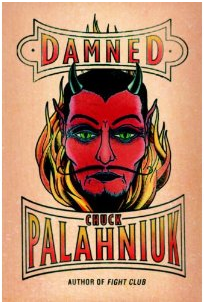 Behind books?
Behind books?
PHAWKER: I’ve never read them, but yes, I’m familiar.
CHUCK PALAHNIUK: They were so enormously successful with Christians because they reinforced the Christian narrative about the afterlife. Part of what I set myself with, with the three books about [Damned protagonist] Madison Spencer is I wanted to write kind of a secular, humanist version of those Left Behind books, that would kind of address the insecurities of how secular humanists would approach the afterlife.
PHAWKER: Did you say books, plural? Is this going to be a series?
CHUCK PALAHNIUK: There will be at least three of these books.
PHAWKER: There is quite a cliffhanger at the end. I’m very interested to see what happens next. There must at least a dozen different demons who play major characters in the story. Are they from real religious texts and belief systems?
CHUCK PALAHNIUK: They are. They’re all from different enormous religious studies that were done in the Middle Ages mostly. And then throw in Liberace and Mapplethorpe for good measure.
PHAWKER: You allude to The Breakfast Club more than once, and in fact, you call Madison’s clique “the Dead Breakfast Club.” Have the films of John Hughes been an influence on you? An artistic connection between you and him seems highly unlikely on the face of it.
CHUCK PALAHNIUK: On the most basic level, I had to think of what would be the most classic love story movies that a 13-year-old girl of right now would like. For her a classic movie would be something like The Breakfast Club, in the same way, for my generation, a classic movie might be Casablanca. So, number one, it’s establishing what would be considered an old movie for Madison, because she’s 13. And on another level, I thought The Breakfast Club was a very interesting version on Jean-Paul Sartre’s idea of hell in his play No Exit. Are you familiar with that?
PHAWKER: “Hell is other people”?
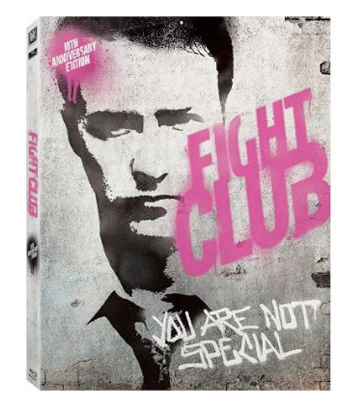 CHUCK PALAHNIUK: Exactly. It consists of one man who finds himself locked in a room with two women in a perpetual argument for the rest of eternity. In a way I thought The Breakfast Club was just a very smart updating of Sartre’s idea. So, in a way, they’re both depicting hell, and so it seemed appropriate that I should use both of those depictions of hell in my depiction of hell.
CHUCK PALAHNIUK: Exactly. It consists of one man who finds himself locked in a room with two women in a perpetual argument for the rest of eternity. In a way I thought The Breakfast Club was just a very smart updating of Sartre’s idea. So, in a way, they’re both depicting hell, and so it seemed appropriate that I should use both of those depictions of hell in my depiction of hell.
PHAWKER: I’ve heard you characterize Fight Club a love story. Would you say that Damned is also kind of a love story?
CHUCK PALAHNIUK: It is…but only because I think all of my books are love stories. There’s always someone looking for a relationship.
PHAWKER: I really appreciated the connections to Wuthering Heights, one of my favorite books. That, to me, was another unexpected connection, but it works. The character Goran, after I thought about it, really did remind me of Heathcliff.
CHUCK PALAHNIUK: It’s so built up in Madison’s mind that Goran is Heathcliff, it almost doesn’t matter what Goran is actually like, because we’re always going to see him through Madison. So, he’s always going to be Heathcliff, because Madison loves him as Heathcliff. Do you remember the Pepe LePew cartoon from Warner Brothers? The skunk who fell in love with a cat?
PHAWKER: Of course.
CHUCK PALAHNIUK: It didn’t really matter whether or not the cat was a skunk, because the skunk wanted the cat to be a skunk so bad, that this poor cat…it didn’t matter…it was out of the loop completely. Goran is out of the loop. He’s always going to be Heathcliff to [Madison].
PHAWKER: Do you see Damned becoming a movie? And on a related note, do you like the films that directors have adapted from your books?
CHUCK PALAHNIUK: I do. I love them. [David] Fincher [with Fight Club] and Clark Gregg with Choke both did great jobs with the resources they had. Both of those stories were thought to be completely impossible to make into films, in the same way my story “Guts” is pretty much impossible to be made into a film, but even that is being made into a film. I think in a way filmmakers like that “impossible” challenge.
PHAWKER: Really? “Guts” is a short story from Haunted, right? The guy in the swimming pool…?
CHUCK PALAHNIUK: Exactly. This summer I met with a Belgian director named Koen Mortier who is adapting the whole book into a movie.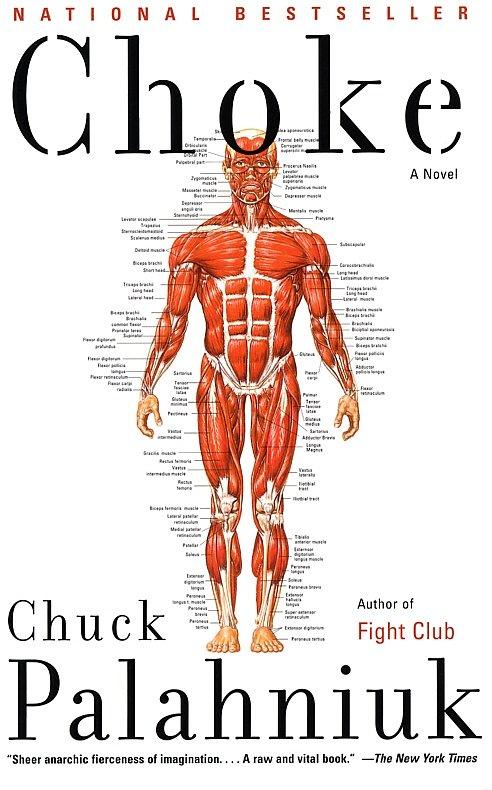
PHAWKER: So, what’s with the candy in the book? It’s used as currency in hell. Do you have a sweet tooth?
CHUCK PALAHNIUK: Hell is such a completely different place from Earth that I wanted to have something very ordinary that people on Earth would be familiar with—that would occur as this great ordinary thing that would give them an idea of Hell, so that here on Earth, as they saw candy or as they saw people on Halloween, it would give them some idea, some attachment to this fictitious Hell I made up. Placing an ordinary thing in this extraordinary circumstance, so that people can relate to it—that’s what the candy does.
PHAWKER: In your hell, they frequently play The English Patient. Clearly you’re not a big fan of the movie. Why? Is it because it’s so formulaic?
CHUCK PALAHNIUK: Number one, I wanted to have a movie that Madison herself wouldn’t really appreciate, so I just picked a movie I can’t really appreciate, one that I’ve never understood or enjoyed. So, in a way, Madison is me: we both just didn’t get The English Patient.
PHAWKER: Fair enough. I understand you used to work as a hospice escort. Did your experience in doing that have any bearing on the macabre humor that’s so prevalent in your novels?
CHUCK PALAHNIUK: Definitely. I think for anybody who works in a profession—whether they’re an emergency worker, a fireman, an emergency room nurse—people who have to deal with death on a regular basis tend to develop this defense mechanism by finding some dark funny side to it.
PHAWKER: Without giving away too much of the plot, Madison’s schoolmates play a prank on her that involves nearly choking her to death. Did you go to private school? Is that prank, initiation or whatever it is inspired by something out of your own childhood?
CHUCK PALAHNIUK: No, I went to Columbia High School in a tiny town out in the middle of the desert with a bunch of poor kids throughout all of grade school. I remember maybe in fifth grade, some new students came to school, and they taught everybody what I think they called the “breathing game.” People would suffocate each other on the playground at recess, and kind of bring each other back to life. None of us had ever 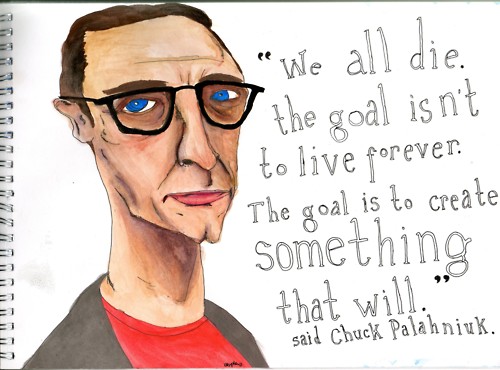 taken drugs before, so this was our kind of first out-of-body experience. And it seemed like such a part of childhood—that people have these choking, breathing, suffocation games. They’re so frightening, but they’re something almost everybody experiences at the age of ten or eleven.
taken drugs before, so this was our kind of first out-of-body experience. And it seemed like such a part of childhood—that people have these choking, breathing, suffocation games. They’re so frightening, but they’re something almost everybody experiences at the age of ten or eleven.
PHAWKER: So you underwent one of these breathing games?
CHUCK PALAHNIUK: Yes, but when we did it, we used to sit on each other’s chests, and use our body weight to suffocate the other people. And people would take turns being suffocated so they could have this strange, hallucinogenic, out-of-body experience. And we did it every recess.
PHAWKER: Did anybody ever get hurt?
CHUCK PALAHNIUK: I’m not sure. Ultimately it got fouled out, because the school wouldn’t permit us to do it, but it was so popular. It was popular for weeks.
PHAWKER: How soon do you plan to release the next book in the series?
CHUCK PALAHNIUK: The second book is the same character, Madison, getting to Purgatory. The third will be her getting to Heaven, ultimately. But right now, I’m almost done with the second book. I might be done by Christmas. I think the publisher would like it to come out late next year, but I would like it to come out in 2013.
PHAWKER: Last question: Do people still approach you on the street and ask you what the first rule of Fight Club is?
CHUCK PALAHNIUK: No. Not really.
